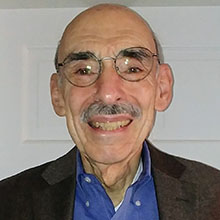Trustee Lee Hoffman: A Lifetime Devoted to Care

Over a 40-year career in medicine, pediatrician Lee Hoffman, MD, saw dramatic change in the field and in patients. However, some constants remained, and one was the disconnect between primary care and behavioral health.
“For the most part, health care is still very segmented today. It was honestly one of my biggest issues in private practice,” he says. “I’d refer a patient to behavioral health, and they either couldn’t get an appointment, the practice didn’t take their insurance, or they would never receive care. Wheeler was often a good option for my patients. Having a model like Wheeler’s now, where we have providers in the same building, that’s the future of health care. I’m excited.”
Hoffman is retired today, enjoying time with his grandchildren, reading, and involvement with a retired physician’s group, but he says he “felt like I needed to do more.”
Wheeler’s shift in the last decade toward integrated health care had appeal, as did its approach of understanding health in the context of larger structural issues.
“Our greatest impact is in helping to ease some of the societal burdens our patients feel that lead to poor health and development,” he says. “It’s clearly shown that lack of access to care, poverty, and failing schools all directly impact the health of children and their development. Which, in turn, affects their functioning for the rest of their life.”
He recalls countless examples when a patient’s wellness was affected by the social determinants of health.
“I recall one patient who was overweight and dealing with diabetes at a young age. I urged him to exercise more, and his mother reminded me that it simply wasn’t safe for him to go outside their apartment,” he says. “There were so many patients and situations where I couldn’t change things that mattered, like finances, or their family dynamics.”
Despite the frustrations, Hoffman loved private practice, and he had two pediatric offices, in Bloomfield and Rocky Hill.
“I had a great mix of patients from all over, and it gave me wonderful insight in how families deal with health crises and access to care.”
He says the biggest change he witnessed in pediatric medicine was twofold: the dramatic increase in immunizations, and how mental health played a role in his pediatric patients.
“When I started practicing, infant meningitis was significant and common, but in the span of my career, immunizations made conditions like that largely disappear in children who were vaccinated,” he says. “But on the other hand, we clearly saw mental health problems increasing, and younger and younger. There are so many new stresses on kids these day that we need to understand and address.”
He sees a future where community-based health like Wheeler’s Family Health & Wellness Centers continue to fill a vital need for patients.
“I think community health centers may set the example for private providers by offering everything in one location,” he says. “Even with the Affordable Care Act, many patients may find limited options in private practice that take their insurance, so we’re going to always need to prioritize making health care available to all.”
“In five years, I can see Wheeler expanding to be the preferred provider of mental health and primary care for the state. We may want to look to incorporating even more medical services in-house. Certainly look to grow our patient base with what we offer, but even today, I don’t see that my own practice could have provided what Wheeler does in one location.”





